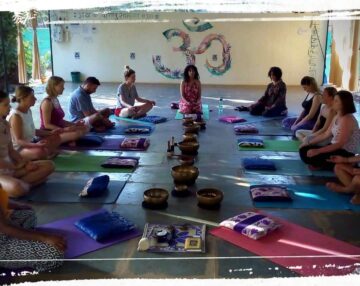I was recently teaching at a retreat and the question was asked “are insecurities and feelings of inadequacy necessary to create the drive to have a successful life?” The question is an interesting one. For me, I felt an almost reflexive response to the question arise (“absolutely not!”), but it’s something that has stayed with me since the retreat and a question I feel I want to take some time to unpack.
Fuel for action
We were very lucky that one of the retreat participants was a Clinical Psychologist and she shared a wonderful model about drive that I’d never heard before. She shared that the energy of drive has two systems it can draw from; the threat system and the soothe system. Drive from the threat system is powerful, explosive, and depleting. It can get a lot done very quickly but is ultimately damaging to the body and unsustainable. This chimes so much with my understanding of constant activation of the fight/flight response and made me think of the threat system as being like fossil fuels; an easy and historically cheap, yet ultimately “dirty” fuel that is harming the host it comes from. The other system is the soothe system. This is drive that comes from a place of calm and is generally less explosive, gentler, but ultimately much more sustainable. It made me think about renewable energy and how it may take more effort for us to learn how to use and harness this energy, but that it’s far cleaner and actually works in harmony with the host that provides it.
The question of using insecurities and feelings of inadequacy as fuel was ultimately one about using the threat system as a way to trigger the drive system. It could be powerful and explosive and many of the world’s most “successful” people have undoubtedly used this to catapult them to great heights of wealth, fame, notoriety and what is classically seen as “success.” And yet there is always a cost to using this kind of fuel source. It might be a cost that comes later down the line but can also be one that is felt every day. To me, this poses another important question; what is a successful life?
A changing definition of success
I remember in my mid ‘20’s I had quite a traditional notion of what would constitute a successful life. I had achieved a “good degree” from a “good university” and begun building myself a “successful career.” This had involved several promotions and pay-rises and lots of additional responsibilities in my first 5 years of full-time work. It had enabled me to buy a brand-new car, get a mortgage for my first house and enjoy a 2-week all-inclusive 5* holiday in Mexico. I was living the dream. Spending lots of money furnishing my new house, workings lots of extra hours to ensure I was able to rise to the challenge of my new responsibilities and planning for a future that would be bigger and better. This first house was a wonderful first house but would be a stepping stone to a bigger one in a better area. I had already decided that I would upgrade the car to the next model up when the initial term ended. I was dreaming of my next holiday being on a Caribbean Island. I thought a lot about the future and how much better it was going to be. Looking back now I realise that was because of how deeply unhappy I was in the present. On paper I suppose I was already quite successful. But the feeling that I needed to keep striving and hustling and be more perfect was suffocating. The fuel that I was using to drive this “success” was toxic and meant I couldn’t enjoy it.
Fast forward to my life now. In many ways, I suppose I’m less “successful” based on almost all conventional metrics. I earn less money than when I was a CEO. I live in a smaller home than that first house and have a smaller car that I share with Kris. I travel to less “flashy” destinations, going on trips and retreats, rather than all inclusive holidays. I don’t dream of a future of opulence and luxury. And yet, I feel a level of contentment that I could not have imagined as a 26-year-old sipping Piña coladas on an all you can eat and drink boat trip in Mexico. I feel a love and appreciation for my body that is so different to the constant judgements I used to feel. My friendships and relationships are so much richer and deeper, and I work fewer hours, whilst doing work that feels aligned and purposeful. I have redefined what it means for me to be “successful.” A successful life for me is one where I’m present for my life and for the people I love. It’s having a regulated nervous system. It’s creating a life that is simple enough that I don’t need to earn a lot to sustain it. It’s the deep belief that I am enough. I have enough. I am doing enough. Ram Dass said that one of his biggest shifts came when he realised he didn’t want to be high, he wanted to be free. This resonates so much for me. For me, a successful life is not one of bigger, better, and more. It’s a life of freedom.




